Most of us learned about African American History in school, but we likely did not dive much deeper than research on slavery, the US Civil War and the Civil Rights Movement. There is so much to uncover beyond this; people from the African Diaspora (term used to denote the African people dispersed during the slave trade) have made immense contributions in countless ways that we can study and learn from.
In 1915, historian Carter G. Woodson and four others established the Association for the Study of Negro Life and History (ASNLH), marking the inception of African American Studies in the US. Nearly a decade later, Negro History Week was introduced in February, coinciding with the birthdays of Abraham Lincoln and Frederick Douglass. To accommodate this, the week was extended to a month-long celebration. In 1976, President Gerald Ford seized the opportunity to recognize the often overlooked achievements of black Americans, officially establishing Black History Month in the US.

Black History Month in the US serves as an opportunity to celebrate Black achievement, reminds us of the progress that still needs to be made to combat systemic racism, and highlights the people and organizations that are acting as agents of change. The theme of Black History Month in 2024 is “African Americans and the Arts.” At FFC, we want to highlight the achievements of Outstanding Black Individuals and Black Groups both in the arts and beyond, recognizing their instrumental impact on American history.
Black History Month: Outstanding Individuals

LeVar Burton
LeVar Burton, an American actor, director, and television host, has been honored with accolades including an NAACP Image Award for Outstanding Actor in a Motion Picture, a Grammy for Best Spoken Word Album, 12 Emmy Awards, and a star on the Hollywood Walk of Fame.
Born in West Germany in 1957, LeVar Burton has dedicated his life to producing content that fosters community, empathy, and diversity, all while upholding integrity. His family shares a commitment to education and integrity, with both paternal grandparents serving as educators and his great-great grandfather, Hal B. Burton, holding an elected Representative position in Arkansas starting in 1887.
Having made his acting debut in 1976, LeVar gained acclaim for his roles in Roots, Star Trek: The Next Generation, and Reading Rainbow, a long-running children’s program credited with instilling a love of reading in millions. In 2012, Burton joined the board of directors for the AIDS Research Alliance, a non-profit medical research organization dedicated to finding a cure for AIDS.
Learn more about LeVar Burton at https://levarburton.com/.
Dr. Margaret Burroughs
Dr. Margaret Burroughs, celebrated as a teacher, poet, activist, and artist, is widely recognized as the founder of the Ebony Museum of Negro History and Art, which is now known as the DuSable Museum of African American History in Chicago.
Hailing from Louisiana, Margaret Burroughs spent her formative years in Englewood, attending Englewood High School, Chicago Teachers College, and the Art Institute of Chicago. Throughout her 20-year tenure at DuSable High School, Dr. Burroughs not only excelled as an educator but also created an extensive body of artwork, including poetry collections, children’s books, prints, and sculptures, all deeply rooted in the Black experience.
At 22, she co-founded the South Side Community Arts Center and played a pivotal role in establishing the DuSable Museum of African American History, described by Burroughs as “the only museum that grew out of the Indigenous Black community.” Recognitions for her contributions include induction into the Chicago Women’s Hall of Fame in 1989 and the Chicago Literary Hall of Fame in 2015. In 1986, Mayor Harold Washington designated February 1st as “Dr. Margaret Burroughs Day.”
Learn more about Dr. Margaret Burroughs at http://www.margaretburroughs.com/.
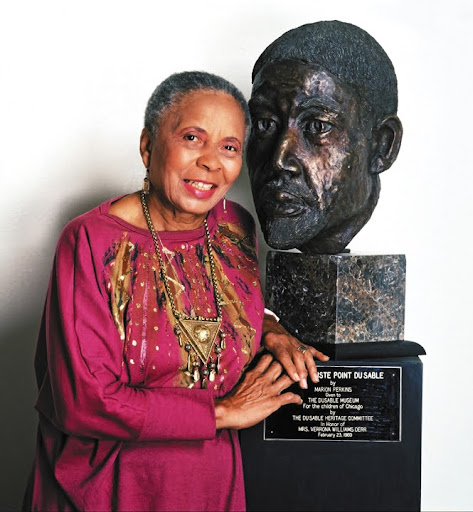
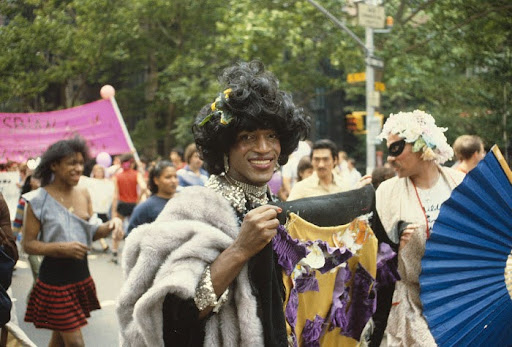
Marsha P. Johnson
Affectionately referred to as “Saint Marsha,” Marsha P. Johnson was a vocal advocate who passionately championed the rights of homeless individuals, sex workers, transgender people, marginalized communities, and those affected by HIV and AIDS.
Born in 1945 in New Jersey, Marsha “Pay It No Mind” Johnson relocated to New York City after completing high school, establishing herself as a notable figure in the city’s gay community. At the forefront of the Stonewall Inn Riots in 1969, her outspoken and courageous actions during the event solidified her as a prominent figure in the Black and Gay Civil Rights movement.
In 1970, Johnson co-founded the Street Transvestite Activist Revolutionaries (STAR), dedicating herself to providing food, clothing, and shelter for young transfolx in New York City, despite the organization’s short existence. In 2019, a statue honoring Marsha and Sylvia Rivera was announced in NYC, marking the first monument to trans women in the city. In 2020, a waterfront park in Brooklyn was named after Marsha by the state of New York.
Learn more about Marsha P. Johnson at https://wams.nyhistory.org/growth-and-turmoil/growing-tensions/marsha-p-johnson/ and https://marshap.org/.
Arthur Ashe
Arthur Ashe, an American professional tennis player and social activist, is widely recognized as one of the greatest in the sport’s history. His impact extended beyond the tennis court, with significant contributions in both athletic and societal realms.
Born on July 10, 1943, Ashe achieved a groundbreaking milestone by becoming the first African American man to win a Grand Slam title at the US Open in 1968. His historic victory at Wimbledon in 1975 solidified his legacy as the inaugural African American man to hold the world No. 1 ranking and gain induction into the Tennis Hall of Fame. His success not only redefined racial norms in the predominantly white sport but also marked a significant breakthrough.
Beyond his athletic prowess, Ashe fervently advocated for civil rights and social justice, actively opposing apartheid and utilizing his platform to address issues of inequality. His unique combination of sportsmanship, intellect, and activism set him apart. In the later years of his life, Ashe dedicated himself to civil rights, authoring “A Hard Road to Glory: A History of the African American Athlete.”
Posthumously, Ashe received the Presidential Medal of Freedom from Bill Clinton, a fitting tribute to his remarkable life achievements.
Learn more about Arthur Ashe at https://www.biography.com/athletes/arthur-ashe.

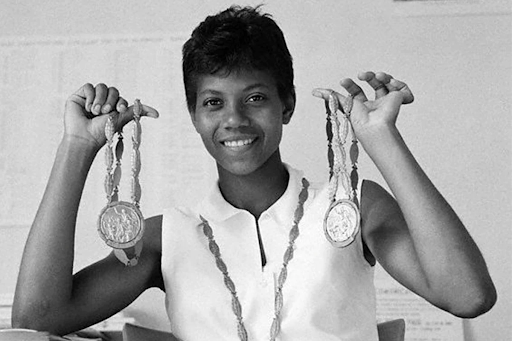
Wilma Rudolph
Wilma Rudolph stands as a symbol of inspiration for people of color and female athletes worldwide. She achieved the historic feat of becoming the first American to secure three gold medals in track and field during a single Olympic Games in 1960.
Born prematurely on June 23, 1940, Rudolph emerged as a trailblazing African American champion in track and field, overcoming significant hurdles on her path to victory. Afflicted with double pneumonia, scarlet fever, and polio in her childhood, she faced challenges with her left leg, necessitating the use of a brace. Through unwavering determination and the aid of physical therapy, Rudolph triumphed over her disabilities.
In the 1956 Olympic Games, Wilma earned a bronze medal in the 4×100 relay. Returning four years later for the 1960 Summer Olympics in Rome, she was resolute in securing gold. Rudolph’s outstanding performance not only solidified her status as one of the 20th century’s greatest athletes but also made her the first American woman to win three gold medals in track and field at the same Olympic Games, earning her the title of “the fastest woman in the world.”
In the 1980s, Rudolph received induction into the US Olympic Hall of Fame and established the Wilma Rudolph Foundation, dedicated to assisting amateur track and field stars.
Learn more about Wilma Rudolph at https://www.biography.com/athletes/wilma-rudolph.
Robert Sengstacke Abbott
Robert Sengstacke Abbott, a prominent African American lawyer, newspaper publisher, and editor, is renowned for establishing “The Chicago Defender.” Abbott played a pivotal role in shaping the discourse on African American rights and making significant contributions to the Great Migration.
Born on December 24, 1870, to formerly enslaved parents, Abbott attended Hampton Institute in Virginia and later graduated from Kent Law School. In 1905, he initiated the publication of “The Chicago Defender,” a groundbreaking newspaper that courageously addressed racial injustices and discrimination.
Through his platform, Abbott actively promoted the Great Migration, encouraging African Americans to relocate from the Southern United States to the North for improved opportunities and freedom from systemic oppression. His newspaper played a vital role in shaping the narrative on civil rights, challenging racial segregation, and providing a powerful voice for the African American community. Abbott’s fearless journalism and dedication to social justice not only influenced his contemporaries but also left an enduring legacy, as “The Chicago Defender” became one of the most widely read African American newspapers in the United States.
Abbott’s contributions are acknowledged for their significant impact on the civil rights movement and the development of African American media, solidifying his status as a key figure in the ongoing struggle for equality and justice.
Learn more about Robert Sengstacke Abbott at https://www.blackpast.org/african-american-history/abbott-robert-sengstacke-1870-1940/.
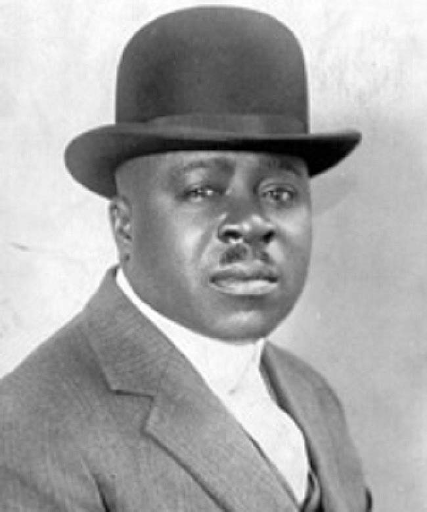
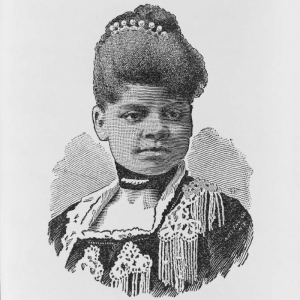
Ida B. Wells
Ida B. Wells-Barnett, a distinguished journalist, activist, and researcher in the late 19th and early 20th centuries, faced and confronted sexism, racism, and violence throughout her lifetime. Leveraging her adept writing skills, Wells-Barnett utilized her role as a journalist to illuminate the challenges faced by African Americans in the Southern United States.
Born on July 16, 1862, Ida entered the world into slavery during the Civil War. Following the war’s conclusion, Wells-Barnett’s parents actively participated in Reconstruction Era politics, emphasizing the significance of education.
Throughout her life, Wells rose to prominence as an investigative journalist, fearlessly revealing the horrors of lynching and racial violence in the late 19th and early 20th centuries. Her groundbreaking reporting, particularly through the Chicago Conservator, one of Chicago’s initial African American newspapers, brought attention to the atrocities of racial injustice. Wells was not only a trailblazer in journalism but also in activism; in 1896, she co-founded the NAACP and played a pivotal role in the women’s suffrage movement. Her unwavering commitment to justice and equality, even in the face of personal threats, established her as a courageous advocate for civil rights.
In 2020, Ida B. Wells was honored with a Pulitzer Prize for her outstanding reporting on the brutal violence against African Americans during the lynching era.
Learn more about Ida B. Wells at https://www.womenshistory.org/education-resources/biographies/ida-b-wells-barnett.
Ethel Waters
Ethel Waters occupies a revered position in history as a groundbreaking African American singer and actress, breaking down racial barriers in the entertainment industry.
Born on October 31, 1896, Waters made her entry into the entertainment industry in the 1920s as a blues singer, making significant contributions to the early jazz and blues scene. Pioneering racial integration, she became the first to grace Broadway, starring in Irving Berlin’s As Thousands Cheer, ultimately becoming the highest-paid performer on Broadway.
Breaking further ground, Waters was the first African American to headline her own television variety show in 1939 and received a Best Supporting Actress Academy Award nomination for the film Pinky in 1950. In 1962, she achieved another milestone, becoming the first African American woman nominated for a Primetime Emmy Award for Outstanding Single Performance by a Leading Lady.
Waters, a dedicated advocate for actors’ rights, held positions on the executive council of Actors Equity and the Negro Actors Guild of America. During World War II, she contributed to the Hollywood Victory Committee and performed on radio for the USO camp shows. Waters’ career showcased resilience and talent in the face of racial adversity, inspiring generations of African American performers. Her enduring legacy speaks volumes about the profound impact of her contributions to the realms of music, stage, and screen.
Learn more about Ethel Waters at https://nmaahc.si.edu/ethel-waters.
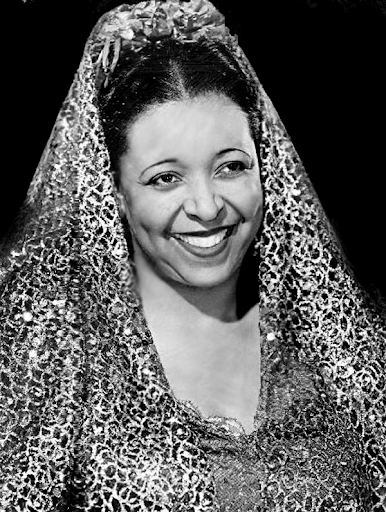
Black History Month: Outstanding Groups
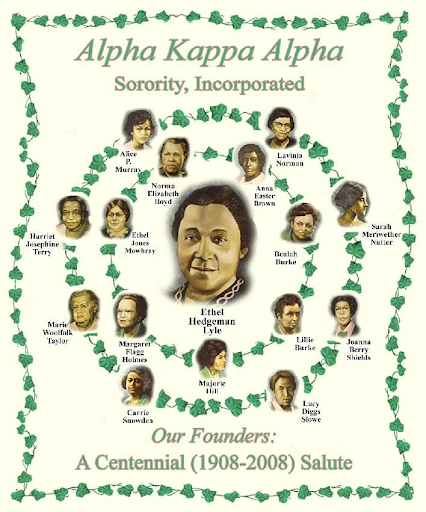
Alpha Kappa Alpha Sorority, Inc.
Nine Founders: Anna Easter Brown, Beulah Burke, Lillie Burke, Marjorie Hill, Margaret Flagg Holmes, Ethel Hedgemon (Lyle), Lavinia Norman, Lucy Diggs Slowe, and Marie Woolfolk (Taylor)
Established in 1908 on the campus of Howard University in Washington, DC, Alpha Kappa Alpha Sorority, Inc. is an international service organization. It holds the distinction of being the oldest Greek-Letter organization founded by African American women with college education.
Learn more about the Alpha Kappa Alpha Sorority and its founders at https://aka1908.com/about/founders/.
Alpha Phi Alpha Fraternity, Inc.
Seven Founders (known as the “Jewels” of the fraternity): Henry Arthur Callis, Charles Henry Chapman, Eugene Kinckle Jones, George Biddle Kelley, Nathaniel Allison Murray, Robert Harold Ogle, and Vertner Woodson Tandy
Alpha Phi Alpha is the first intercollegiate Greek-letter fraternity for African American Men. Originating on December 4, 1906, at Cornell University, it was founded by seven college men who recognized the need for a brotherhood among African descendants in the US.
Learn more about the Alpha Phi Alpha Fraternity and its founders at https://apa1906.net/our-history/.
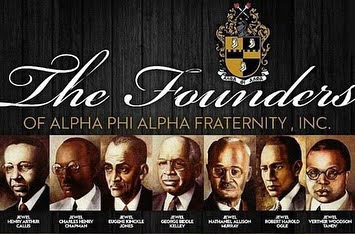
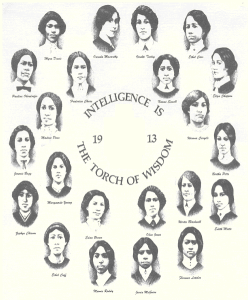
Delta Sigma Theta Sorority, Inc.
22 Founders: Osceola Macarthy Adams, Marguerite Young Alexander, Winona Cargile Alexander, Ethel Cuff Black, Bertha Pitts Campbell, Zephyr Chisom Charter, Mary Edna Brown Coleman, Jessie McGuire Dent, Fedricia Chase Dedd, Myra Davis Hemmings, Olive Claire Jones, Jimmie Bugg Middleton, Pauline Oberdofer Minor, Vashti Turley Murphy, Naomi Sewell Richardson, Mamie Reddy Rose, Eliza Pearl Shippen, Florence Letcher Toms, Ethel Carr Watson, Wertie Blackwell Weaver, Madree Penn White, and Edith Mottie Young.
Established on January 13, 1913 at Howard University, Delta Sigma Theta is an organization of college-educated women dedicated to both personal development and community impact, particularly within the Black community. With a global reach, the sorority strives to offer assistance and support through various programs in local communities worldwide.
Learn more about the Delta Sigma Theta Sorority and its founders at https://www.deltasigmatheta.org/about-delta/.
Kappa Alpha Psi Fraternity, Inc.
Ten Founders (known as the “Nupes” of the fraternity): Elder Watson Diggs, Byron Kenneth Armstrong, Guy Levis Grant, Marcus Peter Blakemore, Ezra D. Alexander, John Milton Lee, Henry T. Asher, Edward G. Irvin, George W. Edmonds and Paul W. Caine.
Since it was founded on January 5, 1911 at Indiana University Bloomington, Kappa Alpha Psi Fraternity has remained committed to fostering brotherhood and serving the Black community. Founded with a clear vision, its founders ensured that Kappa Alpha Nu was an organization with a focus on achievement.
Learn more about the Kappa Alpha Psi Fraternity and its founders at https://www.kappaalphapsi1911.com/history/.
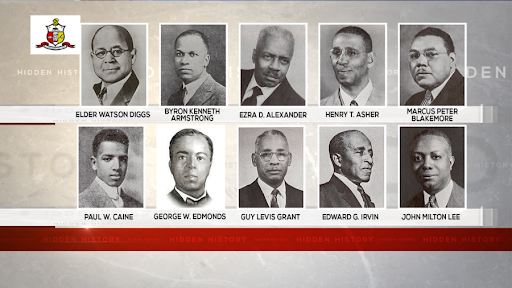
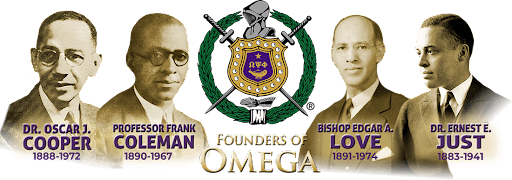
Omega Psi Phi Fraternity, Inc.
Three Founders: Edgar A. Love, Oscar J. Cooper and Frank Coleman along with their faculty advisor Ernest E. Just
Established within the Howard University’s Science Building on November 17, 1911, Omega Psi Phi Fraternity, Inc. is the first international fraternal organization. The name “Omega Psi Phi” is derived from the initials of a Greek phrase meaning “friendship is essential to the soul.”
Learn more about the Omega Psi Phi Fraternity and its founders at https://oppf.org/about-omega/.
Phi Beta Sigma Fraternity, Inc.
Three Founders: A. Langston Taylor, Leonard F. Morse and Charles I. Brown
Founded on January 9, 1914, at Howard University, Phi Beta Sigma prioritizes community service, fostering brotherhood, and advancing scholarships. The founders envisioned an organization that considers itself “a part of” rather than “apart from” the general community.
Learn more about the Phi Beta Sigma Fraternity and its founders at https://phibetasigma1914.org/about/history/.
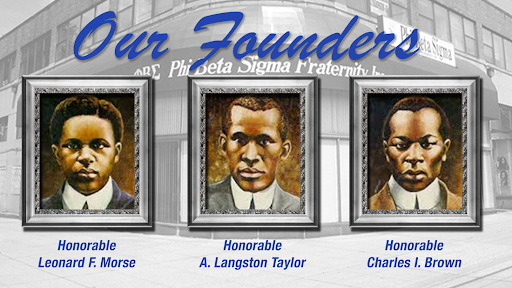
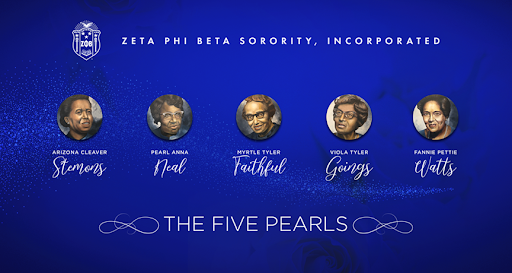
Zeta Phi Beta Sorority, Inc.
Five Founders: Arizona Cleaver Stemons, Pearl Anna Neal, Myrtle Tyler Faithful, Viola Tyler Goings, and Fannie Pettie Watts
Founded on January 16, 1920 at Howard University, Zeta Phi Beta Sorority, Inc. became far more than simply an organization for its founders. Rooted in the desire to provide true Service, embrace Scholarship, set a standard for Sisterly Love and define the noble concept of Finer Womanhood, Zeta Phi Beta Sorority became a movement.
Learn more about the Zeta Phi Beta Sorority and its founders at https://zphib1920.org/about/founders-first-initiates/.
Sigma Gamma Rho Sorority, Inc.
Seven Founders: Mary Lou Little, Vivian Marbury, Dorothy Whiteside, Nannie Mae Johnson, Hattie Mae Redford, Cubena McClure, and Bessie Martin
Formed on November 12, 1922 in Indianapolis, Indiana, Sigma Gamma Rho Sorority, Inc. emerged from seven young educators. On December 30, 1929, the group became an incorporated national collegiate sorority at Butler University. The women of Sigma Gamma Rho have consistently fostered a renowned reputation through sisterhood, leadership, and service.
Learn more about the Sigma Gamma Rho Sorority and its founders at https://sgrho1922.org/SGR/sgr/About/Her_Story.aspx?hkey=e43bba40-e757-42c9-ae20-aa7ac1ebe008.
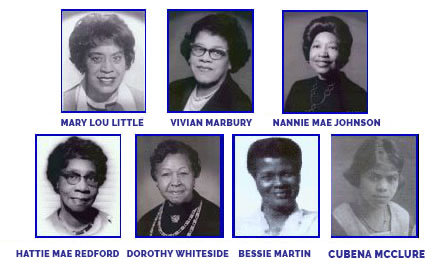
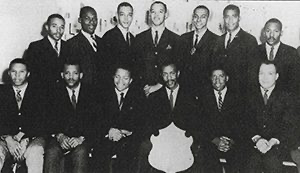
Iota Phi Theta Fraternity, Inc.
12 Founders: Albert Hicks, Lonnie Spruill, Jr., Charles Briscoe, Frank Coakley, John Slade, Barron Willis, Webster Lewis, Charles Brown, Louis Hudnell, Charles Gregory, Elias Dorsey, Jr., and Michael Williams
Founded on September 19, 1963 at Morgan State College (now Morgan State University), Iota Phi Theta Fraternity is the nation’s fifth-largest predominantly African-American social service fraternity. The fraternity’s purpose is, “The development and perpetuation of Scholarship, Leadership, Citizenship, Fidelity, and Brotherhood among Men.”
Learn more about the Iota Phi Theta Fraternity and its founders at https://iotaphitheta.org/historical-overview.

Post written by FFC Marketing Manager, Sydney Meyer.